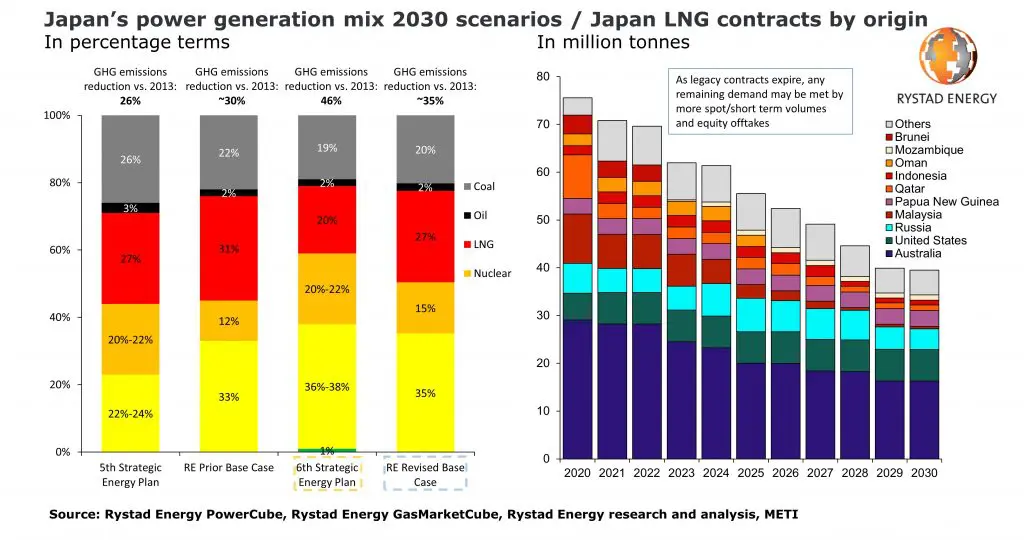Japan’s plans on reducing the use of LNG for power generation are not realistic and will probably not help in reducing emissions targets, according to a Rystad Energy report.
Japan’s recent revision to its Strategic Energy Plan (SEP) lowers the targeted share of liquefied natural gas in the country’s power generation mix in 2030 to 20% from 27% previously, as a measure to cut emissions.
A Rystad analysis concludes that Japan’s targets are “too ambitious” to meet and that the changes the new plan would bring would mostly be in the structure of commodities trading.
Before Japan outlined its sixth SEP, Rystad Energy already considered the earlier 27% target an underestimation, as the Norway-based consultancy expects the country’s LNG reliance to be higher in 2030.
“Our analysis shows that the new 20% target may somewhat reduce the share of LNG in the energy mix compared to what we previously expected – but we do not believe that the share will drop lower than 27%,” Rystad said.
Plan overestimates renewables and nuclear contribution
In absolute terms, Rystad calculates that if Japan realizes the sixth SEP’s targets, the country’s LNG demand in 2030 would drop by 18 million tonnes from the consultancy’s previous estimate of 66 million tonnes.
In Rystad’s base case, however, the country’s revised plan is only likely to remove 4.6 million tonnes of demand in 2030, bringing total LNG demand to 61.4 million tonnes, with the entire reduction coming from the power sector.
“The reason our analysis concludes that Japan will fail to meet its new LNG target share is that the plan overestimates the potential contribution of renewables and nuclear in its power generation,” Rystad said.

The new plan’s proposed 20-22% share for nuclear power will require upwards of 25 gigawatts (GW) of nuclear capacity to become available.
Moreover, this represents a re-start for several, if not all, inactive reactors, on top of the currently operational 10 GW nuclear capacity in Japan, Rystad said.
Spot LNG to replace legacy contracts
The required capacity is a daunting prospect given the widespread local opposition and safety concerns around nuclear power, according to Rystad.
Renewables might also be difficult to deploy as Japan’s small proportion of flat land area (30%) would constrain solar capacity, and the surrounding deep and turbulent seas would limit economically viable offshore wind capacity.
“Even if it is unrealistic, the challenging LNG import reduction target may bring uncertainty to Japanese companies. Legacy contracts will expire in the coming years and could end up being replaced by spot and short-term purchases,” says Kaushal Ramesh, gas and LNG analyst at Rystad Energy.
Companies with short positions will be tested during periods of extreme weather and high-power demand and will have to buy from an increasingly volatile spot market, which might intensify price seasonality in the region.
Those with long positions may operate as portfolio players and on-sell volumes to other regions, Ramesh adds.
May affect multiple LNG producers
Irrespective of its final size, Japan’s demand reduction may affect multiple producers, but disproportionately impact some Asia-Pacific basin players such as Brunei and Papua New Guinea that have historically leaned on Japan for LNG revenues, Rystad said.
While producers have enjoyed exceptional stability and operational performance from Japanese importers, China would probably absorb some of the LNG volume growth lined up for the market, the consultancy said.
“Like we expect in Europe, producers looking to supply Japan’s remaining LNG demand in the years ahead will likely have to demonstrate strong emissions credentials (such as by supplying carbon-neutral LNG) on top of higher flexibility and lower costs,” it said.
This could put some emission-intensive projects in Australia such as Ichthys, Barossa, and Prelude on the back foot, while volumes out of US and Russia could face scrutiny over upstream flaring and venting.
Before Japan’s recent revision, Rystad Energy estimated the global LNG supply deficit in 2030 at 104 million tonnes. Based on currently operational and under-construction LNG projects, Japan’s realistic LNG demand reduction of 4.6 million tonnes in 2030 is only a small trimming to the expected deficit and therefore will only have a limited market impact, Rystad said.
“In an era when projects are struggling to progress due to construction delays, financing delays or environmental concerns, the accelerated energy transition could disproportionally impact the supply side by discouraging investment, and high prices and volatility could continue even if demand falls,” the consultancy said.

